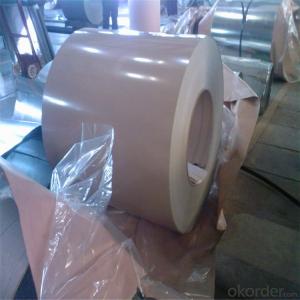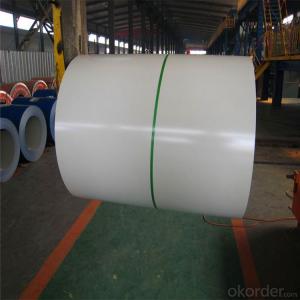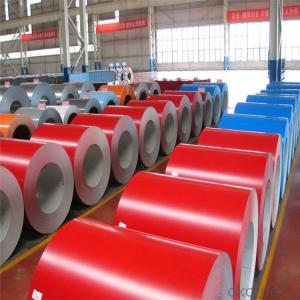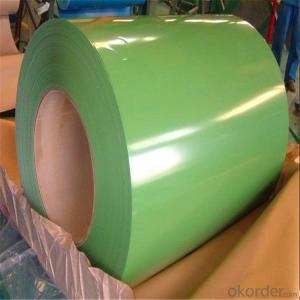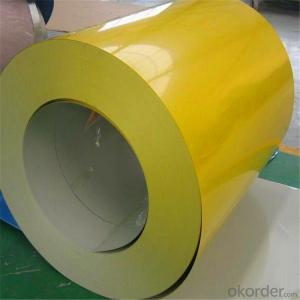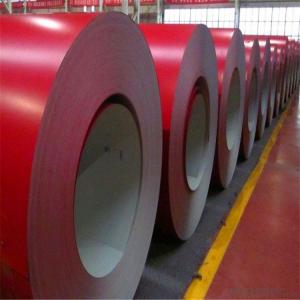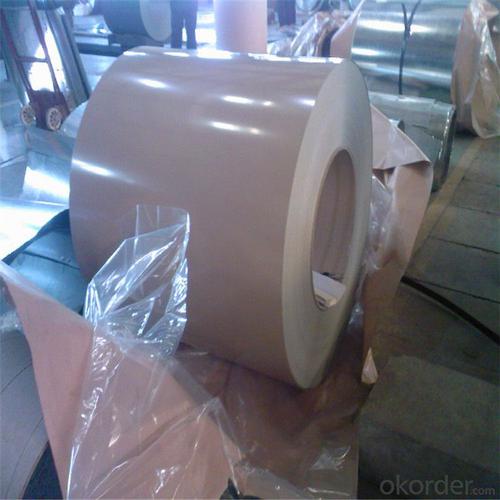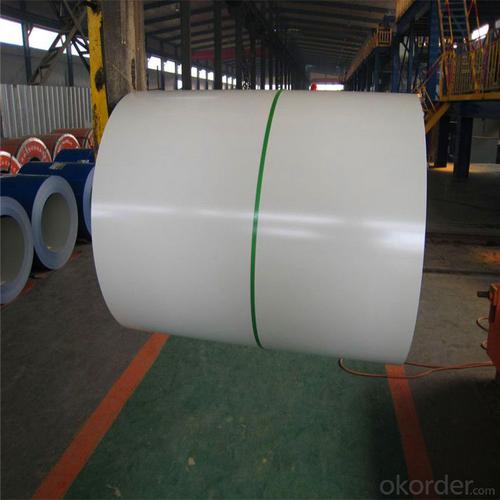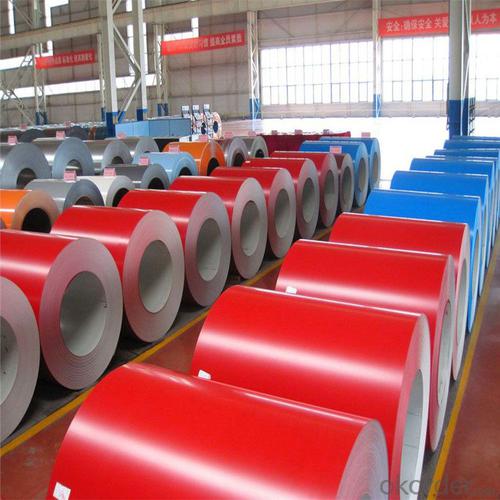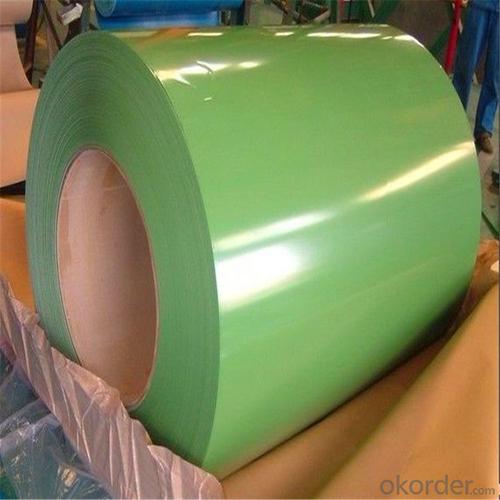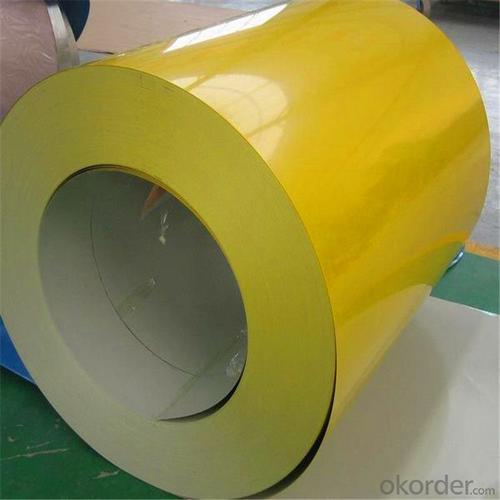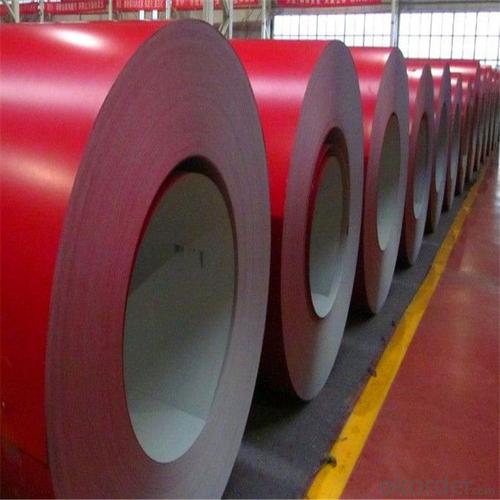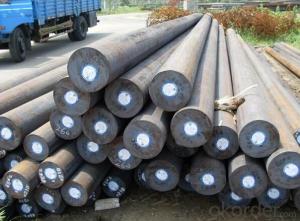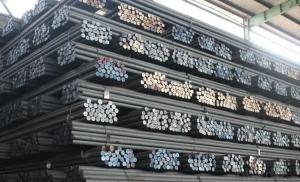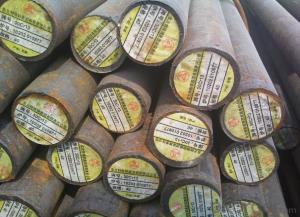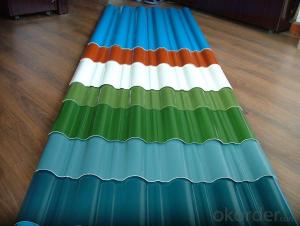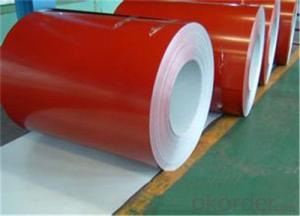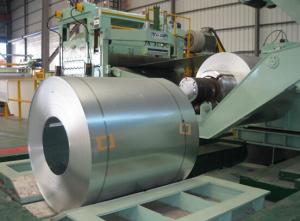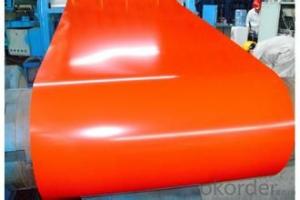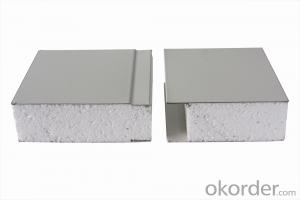Galvanized Steel Sheet in PPGI Coils from CNBM
- Loading Port:
- Tianjin
- Payment Terms:
- TT or LC
- Min Order Qty:
- 25 m.t.
- Supply Capability:
- 5000 m.t./month
OKorder Service Pledge
OKorder Financial Service
You Might Also Like
Specification
Galvanized Steel Sheet in PPGI Coils
Description of Galvanized Steel Sheet in PPGI Coils
Product | PPGI/PPGL |
Capacity | 5,000 tons/month |
Base material | Hot dipped galvanized steel |
Thickness | 0.2-2.0mm |
Width | 600-1250mm(according to your need) |
Coil Weight | 3-6tons |
Quality | SGCC, DX51D |
Color | RAL No. or customers samples’ color |
Zinc-coating | 30g/m2-180g/m2 |
Coil ID | 508mm/610mm |
Technique | Cold rolled—hot dipped galvanized—color coated |
Painting | Top painting:15~25μm |
Back painting: 6~10μm | |
Tolerance | Thickness: +/-0.02mm |
Width:+/-2mm | |
Shipment time | within 15-45 workdays |
Payment | T/T, L/C at sight |
Packing | Standard export packing |
The special order can be negotiated. | |
Application of Galvanized Steel Sheet in PPGI Coils
APPLICATION OF OUR PREPAINTED STEEL | ||||||||||
Construction | Outside | Workshop,agricultural warehouse,residential precast unit | ||||||||
corrugated roof,roller shutter door,rainwater drainage pipe,retailer booth | ||||||||||
Inside | Door,doorcase,light steel roof stucture,folding screen,elevator,stairway,ven gutter,Construction Wall | |||||||||
Electrical applicance | Refrigerator,washer,switch cabnet,instrument cabinet,air conditioning,micro-wave owen,bread maker | |||||||||
Fuiniture | Central heating slice,lampshade,chifforobe,desk,bed,locker,bookself | |||||||||
Carrying trade | Exterior decoration of auto and train,clapboard,container,isolation lairage,isolation board | |||||||||
Qthers | Writing panel,garbagecan,billboard,timekeeper,typewriter,instrument panel,weight sensor,photographic equipment | |||||||||
Products Show of Galvanized Steel Sheet in PPGI Coils

Product Advantages
1.With nearly 20 years experience in prepainted steel, accommodate different marketdemands. | ||||||||||||||
2.'Quality first, service first' is our business aim; 'The good faith get respect,cast quality market' is our Business philosophy . | ||||||||||||||
3.Having two series producttion line,with the abbual production capacity of 240000 tons. | ||||||||||||||
4.Exceed International ISO9001:2008&ISO14001:2004 quality and environmental standards | ||||||||||||||
5.Meet with ROHS standard |
Company Information
CNBM International Corporation is the most important trading platform of CNBM group.
Whith its advantages, CNBM International are mainly concentrate on Cement, Glass, Iron and Steel, Ceramics industries and devotes herself for supplying high qulity series of refractories as well as technical consultancies and logistics solutions.


F A Q
1, Your advantages?
professional products inquiry, products knowledge train (for agents), smooth goods delivery, excellent customer solution proposale
2, Test & Certificate?
SGS test is available, customer inspection before shipping is welcome, third party inspection is no problem
3, Factory or Trading Company?
CNBM is a trading company but we have so many protocol factories and CNBM works as a trading department of these factories. Also CNBM is the holding company of many factories.
4, Payment Terms?
30% TT as deposit and 70% before delivery.
Irrevocable L/C at sight.
5, Trading Terms?
EXW, FOB, CIF, FFR, CNF
6, After-sale Service?
CNBM provides the services and support you need for every step of our cooperation. We're the business partner you can trust.
For any problem, please kindly contact us at any your convenient time.
We'll reply you in our first priority within 24 hours.
- Q: What are the different methods of surface etching for special steel?
- There are several different methods of surface etching that can be used for special steel. These methods include: 1. Chemical etching: Chemical etching involves the use of various acids or other chemical solutions to selectively remove material from the surface of the steel. This method allows for precise control over the etching process and can create highly detailed patterns or designs on the steel surface. 2. Electrochemical etching: Electrochemical etching uses an electrical current to etch the surface of the steel. This method can be particularly effective for creating deep, uniform etches and is often used for marking or labeling purposes. 3. Laser etching: Laser etching involves the use of a high-powered laser to remove material from the steel surface. This method is highly precise and can create very intricate designs or markings. Laser etching is commonly used for branding or decorative purposes. 4. Mechanical etching: Mechanical etching utilizes physical abrasion to remove material from the steel surface. This can be done manually using tools such as sandpaper or brushes, or with the help of machinery like a sandblaster. Mechanical etching is often used to create a textured or roughened surface. 5. Plasma etching: Plasma etching involves the use of a high-energy plasma to remove material from the steel surface. This method is particularly useful for creating very fine, shallow etches and is commonly used in microfabrication or semiconductor manufacturing. Each of these methods has its own advantages and limitations, and the choice of which method to use will depend on factors such as the desired outcome, the type of special steel being etched, and the available equipment and resources.
- Q: How is special steel used in the manufacturing of cutting tools?
- Special steel is used in the manufacturing of cutting tools due to its exceptional properties such as high hardness, toughness, and wear resistance. These qualities allow special steel to withstand the intense forces and abrasion involved in cutting operations. Additionally, it can retain its sharpness for longer periods, ensuring efficient and precise cutting.
- Q: What are the different types of alloy steel?
- There are several different types of alloy steel, including stainless steel, tool steel, high-strength low-alloy steel, and maraging steel. Each type has its own unique composition and properties, making them suitable for various applications in industries such as construction, automotive, and aerospace.
- Q: What are the different types of corrosion-resistant steel?
- There are several different types of corrosion-resistant steel, including stainless steel, galvanized steel, weathering steel, and nickel alloy steel.
- Q: What are the different types of welding techniques used for special steel?
- There are several types of welding techniques used for special steel, including TIG (Tungsten Inert Gas) welding, MIG (Metal Inert Gas) welding, Stick welding, and Flux-cored arc welding. These techniques are commonly used for welding special steel due to their ability to provide strong and precise welds, ensuring the integrity and durability of the material.
- Q: How does special steel perform in welding applications?
- Special steel, also known as alloy steel, performs exceptionally well in welding applications. Its unique composition, which includes various alloying elements such as manganese, chromium, and nickel, enhances its weldability and overall performance. The addition of these alloying elements significantly improves the strength, hardness, and corrosion resistance of the steel, making it highly suitable for welding applications. Special steel possesses excellent weldability, allowing for easy fusion and formation of strong and durable weld joints. Furthermore, the alloying elements in special steel also contribute to its heat resistance, making it capable of withstanding high temperatures during the welding process without losing its structural integrity. This property is particularly crucial in applications where welding involves high heat levels or prolonged exposure to extreme temperatures. Moreover, special steel exhibits good ductility and toughness, enabling it to withstand the stresses and strains associated with welding. It can effectively absorb and disperse heat during the welding process, minimizing the risk of distortion or cracking in the welded joints. In addition to its mechanical properties, special steel also offers excellent resistance to corrosion and oxidation. This makes it highly suitable for welding applications in environments where exposure to moisture, chemicals, or harsh weather conditions is a concern. The corrosion resistance of special steel ensures that the welded joints maintain their strength and integrity over time, even in challenging environmental conditions. Overall, the performance of special steel in welding applications is outstanding, owing to its excellent weldability, strength, heat resistance, and corrosion resistance. Its unique composition and properties make it a preferred choice for a wide range of welding projects, including structural fabrication, pipeline construction, automotive manufacturing, and many more.
- Q: What are the different defense grades of special steel?
- The different defense grades of special steel typically include grades such as AR200, AR400, AR500, and AR600, which are commonly used for protective armor and structural applications. These grades have varying levels of hardness, strength, and resistance to abrasion, making them suitable for different levels of defense against impacts, wear, and penetration.
- Q: How does special steel perform in terms of machinability?
- Special steel generally has good machinability due to its composition and properties. It is often designed or treated to have improved cutting and machining characteristics, such as increased hardness, toughness, and wear resistance. This allows for efficient and accurate machining operations, resulting in high productivity, better surface finish, and reduced tool wear. However, the machinability of special steel can vary depending on the specific grade, heat treatment, and machining conditions used.
- Q: How does special steel perform in high-temperature oxidation conditions?
- Special steel, also known as heat-resistant or high-temperature steel, is specifically designed to perform exceptionally well in high-temperature oxidation conditions. Oxidation, a chemical reaction between the metal and oxygen at elevated temperatures, can lead to the formation of metal oxides and ultimately result in degradation or failure of the material. However, special steel is formulated with alloying elements that provide superior resistance to oxidation. These alloying elements, such as chromium, aluminum, and silicon, form a protective layer of oxides on the surface of the steel when exposed to high temperatures. This layer acts as a barrier, preventing further oxidation of the underlying metal. Additionally, the alloying elements can enhance the formation of stable and adherent oxide scales, which further improve the steel's resistance to oxidation. Special steel's excellent performance in high-temperature oxidation conditions can be attributed to several factors. Firstly, the alloying elements in the steel composition ensure the formation of a protective oxide layer, which acts as a shield against further oxidation. Secondly, the steel's microstructure is specifically designed to maintain stability and retain its mechanical properties even at elevated temperatures. Furthermore, special steel undergoes rigorous heat treatment processes to enhance its high-temperature oxidation resistance. Heat treatment methods such as annealing, quenching, and tempering optimize the steel's microstructure and eliminate impurities, ensuring its optimal performance in extreme conditions. Overall, special steel demonstrates exceptional resistance to high-temperature oxidation conditions due to its carefully selected alloying elements, tailored microstructure, and optimized heat treatment processes. It provides a reliable and durable solution for various industries that require materials to withstand severe oxidation environments, ensuring optimal performance and longevity in these challenging conditions.
- Q: How does special steel contribute to the construction equipment industry?
- The construction equipment industry heavily relies on special steel to ensure the necessary strength, durability, and resistance to wear and tear in their heavy-duty equipment. Extreme conditions, including heavy loads, harsh environments, and constant use, demand the use of special steel alloys that are specifically designed to withstand these challenges and guarantee the equipment's longevity and reliability. One of the major contributions of special steel to the construction equipment industry lies in its impressive strength-to-weight ratio. This characteristic allows manufacturers to design and produce equipment that is both robust and lightweight. Implementing special steel in the construction of crucial equipment components such as chassis, booms, buckets, and blades enhances their load-carrying capacity and overall performance. Additionally, special steel offers exceptional corrosion resistance, which is a significant advantage in construction sites where equipment is exposed to moisture, chemicals, and other corrosive substances. By utilizing corrosion-resistant special steel alloys, manufacturers can extend the lifespan of construction equipment and reduce maintenance costs. Moreover, special steel plays a vital role in providing superior wear resistance. The abrasive materials encountered in construction sites, such as rocks, gravel, and concrete, can cause significant wear on equipment components. Special steel alloys with high hardness and wear resistance properties help minimize wear and prolong the service life of the equipment, reducing the need for frequent replacements and downtime. Furthermore, special steel enables the construction equipment industry to meet specific performance requirements. Various types of special steel alloys can be tailored to meet specific needs, such as impact resistance, high-temperature resistance, or low-temperature toughness. This versatility allows manufacturers to produce equipment that can efficiently operate in diverse conditions, ultimately enhancing the industry's overall productivity. In conclusion, special steel plays a crucial role in the construction equipment industry by providing the necessary strength, durability, resistance to wear and tear, and customization options. By incorporating special steel alloys into their manufacturing processes, equipment manufacturers can produce high-quality machinery that meets the demanding requirements of construction sites, thus improving productivity, safety, and efficiency within the industry.
Send your message to us
Galvanized Steel Sheet in PPGI Coils from CNBM
- Loading Port:
- Tianjin
- Payment Terms:
- TT or LC
- Min Order Qty:
- 25 m.t.
- Supply Capability:
- 5000 m.t./month
OKorder Service Pledge
OKorder Financial Service
Similar products
Hot products
Hot Searches
Related keywords
